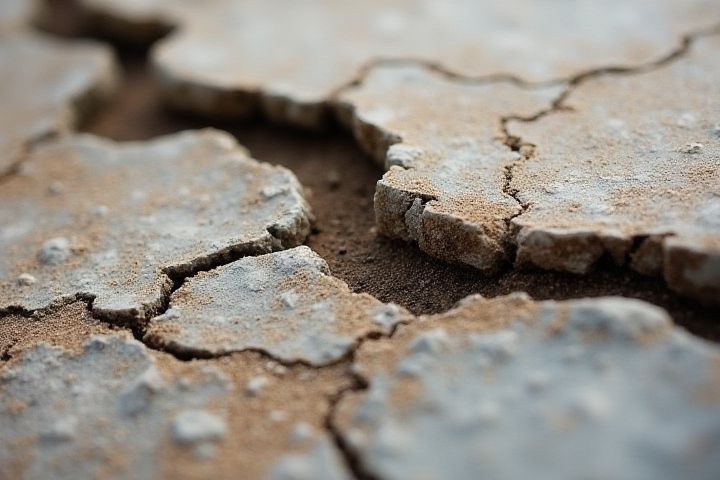
If your house foundation is cracked, it's crucial to assess the severity of the damage. Small hairline fractures may indicate normal settling, but larger cracks can point to significant structural issues. You should consider consulting a structural engineer to evaluate the cracks and determine if professional repairs are necessary. It's also essential to address underlying causes such as poor drainage, soil erosion, or plumbing leaks that could have contributed to the foundation problems. Regular maintenance and monitoring of your home's foundation can help prevent further damage and ensure your home's structural integrity.
What To Do If House Foundation Is Cracked
Assess the severity of the crack
Assessing the severity of a crack in your house foundation involves carefully inspecting its width, depth, and length. Hairline fractures may indicate minor settling, while cracks wider than 1/4 inch could signal more serious issues requiring immediate attention. Look for vertical, horizontal, or diagonal patterns, as these can help determine the type of foundation problem. Document your findings with photographs and measurements, as this information will be useful for professionals if repairs are necessary.
Hire a structural engineer
Hiring a structural engineer is crucial if you notice cracks in your house foundation, as they possess the expertise to assess the severity and underlying causes of the damage. An experienced structural engineer can conduct a detailed inspection and provide insights on whether the foundation is stable or requires repairs, which may involve specialized techniques such as underpinning. Typically, you can expect to invest between $300 to $1,500 for a professional evaluation, depending on your location and the complexity of the issues. Addressing foundation cracks promptly can prevent further structural issues, ensuring the safety and longevity of your home.
Implement temporary stabilization measures
If you notice cracked foundation issues in your house, implementing temporary stabilization measures is crucial. First, assess the extent of the cracks in inches; anything larger than 1/8 inch may need immediate attention. You can use hydraulic jacks to lift and support affected areas, redistributing weight evenly and preventing further movement. Lastly, ensure proper drainage around your foundation, as managing moisture can help prevent additional cracking in the future.
Avoid immediate DIY repairs
If you discover cracks in your house foundation, avoid immediate DIY repairs to prevent exacerbating the issue. Instead, focus on diagnosing the underlying cause of the damage, which may include soil erosion, poor drainage, or plumbing leaks. Consulting with a qualified structural engineer can provide a detailed assessment and potential solutions tailored to your situation. Ensure you monitor the cracks over time to determine if they are stabilizing or worsening, as this will inform any necessary professional intervention.
Investigate underlying causes
Investigate underlying causes by examining drainage systems, ensuring that downspouts direct water away from the foundation, ideally at least six feet. Assess soil conditions surrounding your home, as expansive soil can exert pressure on foundations, leading to cracks. Monitor for plumbing leaks that may contribute to moisture issues, which often exacerbate foundation problems. Consult with a structural engineer for a comprehensive analysis, as they can identify specific issues and recommend appropriate repair methods tailored to your home's needs.
Prioritize proper drainage maintenance
If your house foundation is cracked, prioritizing proper drainage maintenance is crucial to prevent further damage. Ensure that gutters and downspouts direct water away from the foundation, keeping the surrounding soil adequately drained. Regularly check for any pooling water around your home's perimeter and address any landscape grading issues that may contribute to excess moisture accumulation. Investing in a professional inspection can also help identify drainage problems, allowing you to implement effective solutions to protect your foundation.
Consult with foundation repair specialists
Consulting with foundation repair specialists is crucial when dealing with cracked foundations, as they provide expert assessments and tailored solutions. These professionals utilize advanced diagnostic tools to determine the extent of the damage, often recommending repairs ranging from epoxy injections to complete underpinning. In addition, you should ensure that the specialists have credentials such as licenses and insurance, as this ensures protection for both you and your property. Addressing foundation issues promptly can help prevent structural damage, potentially saving you thousands of dollars in future repairs.
Obtain multiple repair estimates
When faced with a cracked house foundation, obtaining multiple repair estimates is crucial for finding the best solution tailored to your situation. Ideally, get quotes from at least three reputable contractors who specialize in foundation repair to ensure a comprehensive understanding of the potential costs and methods involved. Each estimate should detail not only the price but also the materials and techniques recommended, allowing you to compare the long-term value of each option. You can save money and ensure quality workmanship by taking the time to review these estimates carefully before making a decision.
Consider underpinning solutions
If you notice cracks in your house foundation, consider underpinning solutions as a primary option for stability. Underpinning involves reinforcing the foundation by extending its depth or width, typically using concrete or steel piers to support the structure. This method effectively transfers the load of your home to stronger soil layers, mitigating risks associated with soil settlement or erosion. Consult with a structural engineer to assess the extent of the damage and customize a comprehensive underpinning plan tailored to your specific foundation issues.
Monitor for further changes
If you notice cracks in your house foundation, it's essential to closely monitor the situation for any further changes. Take note of the size and progression of the cracks by measuring their width with a ruler; cracks wider than 1/4 inch may indicate significant issues. Regularly inspect the foundation and surrounding areas, especially after heavy rainfall or extreme temperature changes, as these conditions can exacerbate existing cracks. Document any changes with photographs and measurements to provide your contractor with comprehensive information if professional assessment or repairs become necessary.
